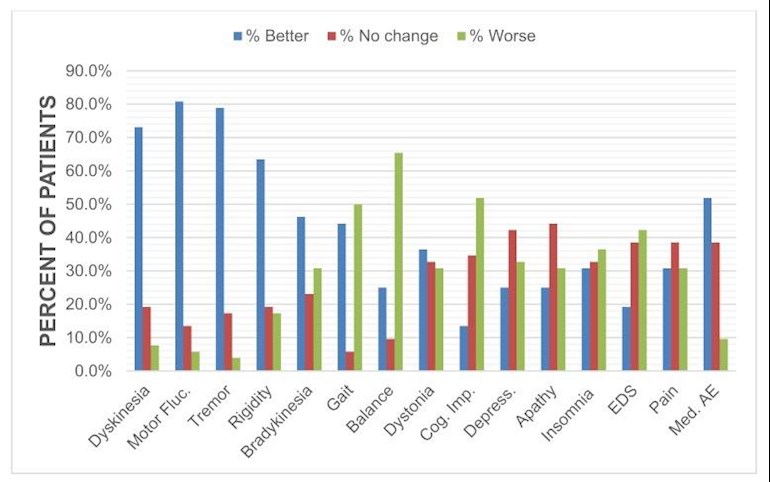Long-Term Satisfaction and Patient-Centered Outcomes of Deep Brain Stimulation in Parkinson’s Disease 2018
Long-Term Satisfaction and Patient-Center... - Cure Parkinson's
Long-Term Satisfaction and Patient-Centered Outcomes of Deep Brain Stimulation in Parkinson’s Disease

Interesting. I’m much more interested in FUS though
It's hard to tell from this graphic what % of patients are happy overall?
Looks like one would be trading dyskinesia, tremor, rigidity, and bradykinesia for loss of balance (and gait which leads to falls and broken bones) and for several psychological deficits such as cognitive impairment, depression, apathy, etc.
I would have to think long and hard before agreeing to such trade-offs.
ncbi.nlm.nih.gov/core/lw/2....
^this one
"Patient endorsement. The percent of patients reporting degree of endorsement on the RUSH-DBS-Q. All questions were scored from 0 to 10, whereby 0 represented the most ‘positive’ answer. The questions centered around making the correct decision to undergo DBS, theoretical decision to proceed again with DBS, timing of DBS, confidence in recommending DBS to others, and overall satisfaction with DBS."
I am not understanding this graph. On one hand looks like 70% scored 0/thought it was the correct decision and would do it again, yet 35% scored 0 indicating complete happiness??
I agree Marc. There are 3 possibilities I see:
1: People were generally satisfied with DBS.
2: Having 0 as most positive confused people.
3: I noticed this paper is evaluating patient satisfaction at Rush, and 3 out of 4 doctors listed as authors work for Rush, but the conflict of interest statement shows no conflicts of interest.
Me either, really. From the body text:
Satisfaction was high with median score (range) of 1/10 (0–8) at the time of survey. Patients endorsed having made the correct decision by undergoing DBS, with a score of 0 (0–10), would choose to have DBS again, with a score of 0 (0–10), and would recommend DBS to others, with a score of 0 (0–10).
I think what they are saying is that 36 (ish) percent rated that satisfaction at Zero, and 17 (ish) said 1. So 54 (ish) percent said 0 or 1. Which is consistent them saying the median score was 1. And the lowest was 8.
I think the discrepancy is that you wouldn't need to be 'satisfied' to conclude that it was the correct decision. You would just need to conclude that it was worth the opportunity cost.
disturbing research, also due to the fact that 12 out of 52 participants died at follow-up.
Quote
”4.1. Participants
Ninety-four PD patients were identified who received simultaneous bilateral STN DBS a minimum of five years earlier. Fifty-two patients (thirty-one male, twenty-one female) were enrolled, thirty-one were lost to follow up of whom at least twelve were deceased, six were non-English-speaking, five refused to participate, and one had been explanted. Patients who received unilateral STN or DBS in other targets were excluded from participation. "
12 out of 94 Gioc.
We don't know why each died, but if it were connected in any way to the DBS, nobody would knowingly accept those odds.
'We want to perform brain surgery on you in which you have a 50/50 chance of being satisfied and a 12% of dying.'
PS plus ... 3 out of 4 doctors listed as authors work for Rush... should have been pointed out since it was a review of essentially their own work.
Great points, but it is even a tad worse: 50% of patients satisfied, and the other 50% worse off than when they started. I may be stating it too strongly, but there is some distance between "not being satisfied" and "being worse off than before treatment".
We also have to wonder if the 20% who died were satisfied with their results.